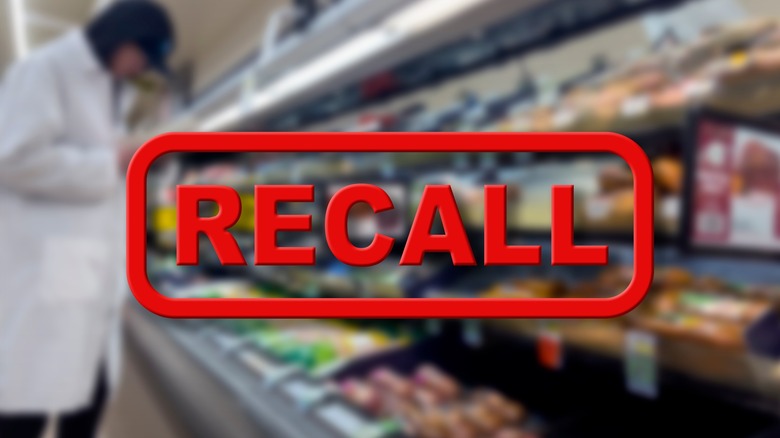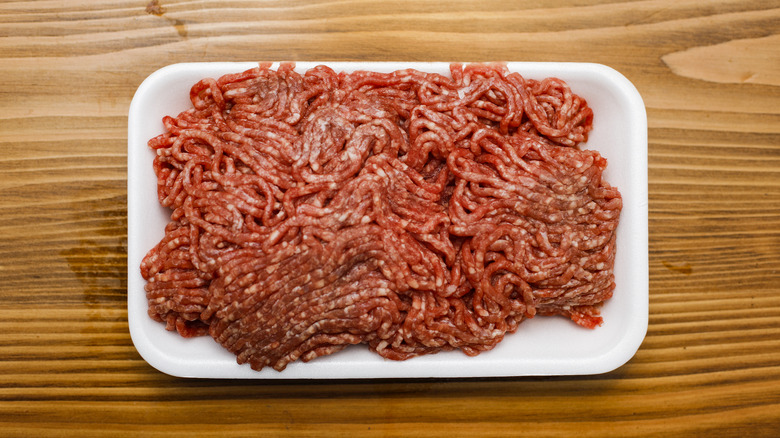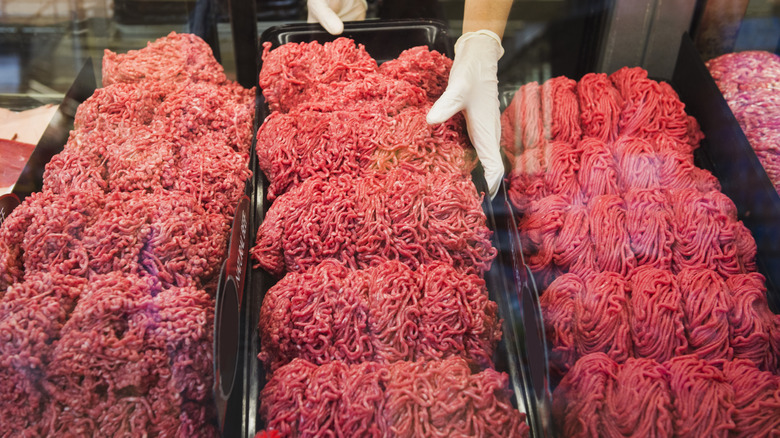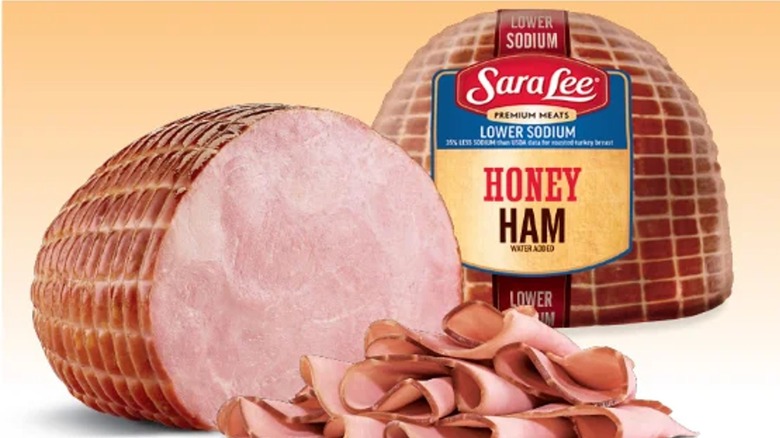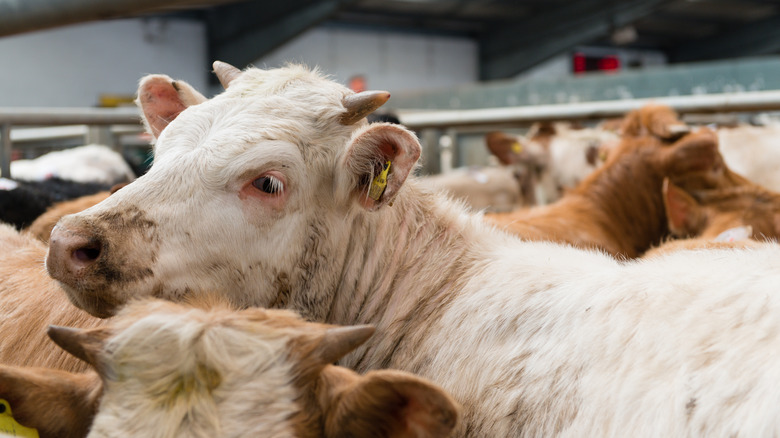The Biggest Meat Recalls In US History
If it seems as if we've had more big meat recalls in the past few decades in the U.S., it's because we have. Most of our big recalls have been related to E. coli, Salmonella, or Listeria outbreaks that resulted in illnesses and even occasional (though thankfully rare) deaths. However, there have been a few recalls related to other things including possible foreign objects discovered in food, faulty packaging, and the potential that meat from sick animals was mixed with meat from well ones.
The meat recalls on our list start at 2 million pounds of meat and only get larger from there. The largest meat recall in U.S. history so far was nearly four times as big. The good news is that some of the earlier large recalls helped to pave the way for the current food safety regulations that we rely on to keep us safe and prevent more large-scale recalls than we already have.
Over 2 million pounds of Simmons Prepared Foods poultry in 2019
The smallest recall on our list concerns the 2,071,397 pounds of poultry that Simmons Prepared Foods recalled in 2019. The reason for this recall was that an internal inspection uncovered metal contamination in some poultry items. Thus, the Gentry, Arkansas, company enacted a recall of whole chickens, chicken pieces, and tenderloins that could have also contained metal.
All the questionable chicken came out of the plant between October 21 and November 4, 2019 and headed to institutions in eight states, such as schools, hospitals, and restaurants. The recall affected local institutions in Arkansas and nearby Oklahoma, as well as in more distant states like Arizona, California, Georgia, Minnesota, and Pennsylvania.
While institutional buyers were asked to dispose of or return the products, the worry was that some institutions still had affected products in their freezers. Luckily, nobody reported any mishaps with the potentially affected poultry products.
2.6 million pounds of ConAgra canned meat in 2023
Of the two huge recalls ConAgra has on our list, the smallest and most recent happened in 2023 when it recalled 2.6 million pounds of canned meat from store shelves.
The recalled canned meat was sold under various labels, including both meat and poultry varieties of Vienna sausages from Armour Star, Goya, Grace, Great Value, Hargis House, Hereford, Kroger, Prairie Belt, and Valrico brands. Hargis House Potted Meat was also affected. The canned meat in question was packaged improperly and may have been affected by leakage or pathogens as a result. The Iowa-based company found that some of the meat was spoiling in the can. The company warned customers to throw away the cans or return them to stores, since they may not have been able to detect the damage themselves.
The recalled cans were packed between December 12, 2022, and January 13, 2023 and had been shipped to retail locations throughout the U.S. At the time of the recall, nobody had complained of becoming ill.
Over 5.7 million pounds of Huntington Meat Packing beef and veal products in 2010
The initial beef and veal recall from the Huntington Meat Packing plant in Montebello, California took place on January 18, 2010 and included 864,000 pounds of meat for products made between January 22, 2009 and January 4, 2010. The recall eventually expanded to include 4.9 million more pounds of products, bringing the total recall up to nearly 5.76 million pounds of beef patties, ground beef, beef burrito filling mix, diced beef, and veal patties under Imperial Meat Co., El Rancho, and Huntington labels.
The recall occurred after an inspection by the USDA's Food Safety and Inspection Service (FSIS) uncovered E. coli contamination and unsanitary packing conditions that didn't follow the company's food safety plan. One employee even pled guilty in 2015 to providing the FSIS with falsified documents that claimed the company's meat was E. coli-free.
Once it became clear the company's food safety records were unreliable at least as far back as a year, the recall expanded to cover everything produced in that period. Further review indicated a need to recall any meat consumers might still have in their freezers that had been produced between February 19 and May 15, 2008. Nobody was reported to have become ill due to the contamination. The plant is now permanently closed.
7.2 million pounds of Boar's Head ready-to-eat deli meats in 2024
The most recent meat recall on our list happened when 7.2 million pounds of Boar's Head deli meats were removed from shelves starting on July 26, 2024 after a Listeria monocytogenes outbreak. What began with the Maryland Department of Health finding Listeria on a liverwurst sample turned into a larger Class I recall as more people became sick.
The recall initially concerned 207,528 pounds of product produced in the company's Jarratt, Virginia plant at the same time as the tainted liverwurst sample (between June 11 and July 17, 2024). As of July 30, 2024, the recall included not only liverwurst but also ham, bologna, salami, and pre-cooked bacon. It soon extended to products May 10 and after and came to include 71 total products. Consumers and retailers were asked to throw away any recalled meat and to clean refrigerators and equipment thoroughly. In case of cross-contamination, delis were asked to remove any other open packages of meat or cheese that were near recalled products.
As of August 8, 2024, the Listeria outbreak caused 43 reported illnesses in 13 states between May 29 and July 19, 2024. Of those who fell ill, all required hospitalization and three died. Fortunately, the only pregnant person affected did not lose their pregnancy.
9 million pounds of Rancho Feeding Corp beef products in 2014
The recall of beef processed at the Rancho Feeding Corp slaughter facility in 2014 was nothing less than a nightmare. No matter how well ranchers took care of their cattle before slaughter, the fact that they passed through the Rancho Feeding Corp facility made them suspect because healthy cows weren't separated from diseased cows. The recall involved everything that went through the facility for nearly a year between January 1, 2013 and January 7, 2014.
After an employee provided a tip that the facility was slaughtering diseased and potentially cancerous cattle, the USDA raided the premises. It turned out that the company had been slaughtering diseased cows after closing time, when there weren't any USDA inspectors around. Workers had even reportedly swapped out diseased cow heads with healthy ones to make everything look normal. Several employees and the owner of Rancho Feeding Corp were sentenced to prison terms for their role in the coverup.
After the recall, scandal, and imprisonments, Rancho Feeding Corp closed down and the empty facility was purchased by another company. While the recall carried a high health risk, nobody appears to have become sick from tainted meat. However, local ranchers who'd had cattle slaughtered lost a total of $27 million they were never able to recover.
12.1 million pounds of JBS Tolleson beef in 2018
While some of the recalls here produced no reported illness or at least relatively few, the Salmonella Newport outbreak at JBS Tolleson in 2018 left hundreds ill. The initial recall on October 4, 2018 was for 6.9 million pounds of ground beef, and another 5.2 million pounds of raw beef products were recalled on December 4, 2018 to bring the total to over 12 million pounds of beef.
The recall covered meat packaged between July 26 and September 7, 2018. The meat had gone out to over 100 retailers and customers were asked to either throw the beef away or return it to the store.
People started getting sick on March 22, 2018 with the last reported illness on March 22, 2019, meaning the outbreak lasted a staggering year before it was under control. Ultimately, 403 people in 30 states fell ill. Of those, 117 were hospitalized, though no deaths were reported as a result of the outbreak.
19 million pounds of ConAgra ground beef in 2002
It took nearly 20 people succumbing to E. coli before the illnesses were traced to ConAgra Beef Company in Greeley, Colorado in 2002. Those who fell ill from eating infected hamburger meat were in Colorado, California, Washington, Wyoming, South Dakota, and Michigan. What started out as a 354,200-pound recall of meat on June 30, 2002 increased to 18.6 million pounds of ground beef and beef trimmings by July 19, 2002.
The recall happened after the FSIS found E. coli in a beef sample at the Greeley plant on June 19 and were able to trace 18 cases to the very same strain of E. coli. The recalled meat was produced between April 12 and July 11, 2002.
The first E. coli symptoms started cropping up in consumers on June 1, 2002. A total of 18 became sick, seven were hospitalized, and five developed a type of kidney failure called hemolytic-uremic syndrome (HUS). However, none died.
21.7 million pounds of Topps Meat frozen ground beef patties in 2007
The Topps Meat recall began on September 25, 2007 and was for 331,582 pounds of frozen hamburger patties and 21 other beef products. The plant that produced the meat was in Elizabeth, New Jersey, but illnesses caused by E. coli contamination spread through New Jersey and seven other states, including New York, Pennsylvania, Ohio, Connecticut, Maine, Indiana, and Florida. By September 29, the recall reached 21.7 million pounds of products sent out to grocery retailers and institutions across the U.S.
The recall expanded because the company didn't have good process controls throughout its plant to ensure that other meat was safe. What's more, the company often carried meat from one day over to the next, which made it more difficult to trace and stop the contamination.
All told, 40 people became sick due to the outbreak between July 5 and September 24, 2007. At least 21 were hospitalized and two developed HUS kidney failure, though nobody died. The small 67-year-old meat company was completely sunk by the recall and closed permanently shortly after the recall turned epic in proportion, with all its 87 employees losing their jobs and several lawsuits pending.
25 million pounds of Hudson Foods ground beef patties in 1997
The earliest large meat recall on our list happened between July and August of 1997 when Hudson Foods recalled 25 million pounds of ground beef that had gone to a variety of stores and restaurants. It began small, with just 20,000 pounds of meat in the first recall. However, it expanded to 1.2 million pounds and again to 25 million pounds when the Columbus, Nebraska, plant realized more meat in the plant might be contaminated with E. coli than originally thought.
Like with the Topps Meat recall, Hudson Foods contaminated multiple batches by carrying over meat from one production day to another. Thus, E. coli could contaminate many more products in a long, continual chain. Four years earlier in 1992, an E. coli outbreak from the plant killed four children and sickened hundreds more who ate at a Jack in the Box.
This time around, a total of 15 people who had eaten infected meat from Hudson Foods became sick between June 14 and July 14, 1997. While five were hospitalized, none developed kidney failure or died. This recall inspired new federal food safety protocols in 1998. Rogers, Arkansas-based Hudson Foods also merged with Tyson Foods of Springdale, Arkansas, in the aftermath.
27.4 million pounds of Pilgrim's Pride ready-to-eat chicken and turkey products in 2002
There was no doubt that a huge recall was necessary when Pilgrim's Pride discovered Listeria monocytogenes in its roasted chicken and turkey beast products as well as its pre-cooked deli-style chicken. The recall started with only 295,000 pounds of products, starting on October, 12, 2002. However, after finding Listeria throughout the entire Franconia, Pennsylvania, plant, a recall of all 27.4 million pounds of fresh and frozen, pre-cooked, poultry products the facility had produced between May 1 and October 11 of 2002 was warranted. This enormous recall occurred just a few months after the 19 million-pound beef recall from ConAgra earlier that summer.
At the time of the recall, the company had already delivered products across the U.S. to grocery stores, restaurants, and institutions, meaning they had to be pulled off shelves quickly. At the same time, consumers were asked to return them to stores.
Not only was the recall intense, but so were the repercussions of the Listeria outbreak. Forty-six people fell ill in 22 states between July 18 and September 30, 2002. Almost all of them had to seek hospital treatment. Of those who became seriously ill, three had miscarriages or stillbirths and seven died.
35 million pounds of Sara Lee deli meat and hotdogs in 1998
In 1998, Sara Lee's parent company, Bil Mar Foods, recalled 35 million pounds of deli meat and hot dogs worth $76 million dollars. However, it was a slow recall even after consumers started contracting Listeria.
Consumers started to get sick on August 2, 1998. However, officials didn't trace it to Sara Lee for a while, with the recall not happening until over four months later on December 22, 1998. A big failing of the recall was that there was no press release early on, almost no publicity about it, and no mention of how large and deadly the Listeria outbreak was until January 28, 1999. Meanwhile, over 100 people became sick from Listeria in 22 states, ultimately resulting in six miscarriages and 21 deaths by January 20, 1999.
At the time of the incident, there weren't as many food safety regulations in place as there are now, and the USDA wasn't as quick to push for a recall. While there was no proof the company was selling tainted meat on purpose, inspections uncovered old meat and roach infestations in the plant. There were multiple lawsuits, and Sarah Lee pled guilty to federal misdemeanor charges, including one it settled with the U.S. government for $4.4 million.
Over 36 million pounds of Cargill turkey in 2011
It took months for a serious outbreak of Salmonella Heidelberg to finally lead to the recall of over 36 million pounds of Cargill turkey in 2011. The illnesses were ultimately traced back to a Springdale, Arkansas plant where various types of ground turkey products were made.
By its end, 136 people in 34 states grew ill from Cargill turkey between February 27 and September 13, 2011. Because this strain of Salmonella was resistant to several antibiotics, it was more difficult to treat. Of those known to be infected, one died.
Salmonella was found during routine inspections at the facility, finally linking the illnesses to the source. Unfortunately, it took six months after the first illness to make the connection. A general public health alert concerning ground turkey products was issued on July 29, 2011, but the recall specific to Cargil didn't happen until August 3, 2011. The first round of Cargill recalls was for 36 million pounds of turkey, while a second concerning another 185,000 pounds was issued on September 11, 2011. The recall was so large because one infected bird can infect a lot of ground turkey when it's all ground together, since that's how most types of ground meat are produced. Plus, the recall had to cover turkey produced between February 20 and August 2, 2011, since it took so long to trace. Cargill Meat Solutions also faced a ground beef recall in May 2024.
143 million pounds of Hallmark/Westland ground beef in 2008
The biggest meat recall in U.S. history happened in 2008, when Hallmark/Westland recalled a whopping 143 million pounds of ground beef. While nobody became ill or died, it was still a big deal.
The recall happened after the Humane Society released a video on January 30, 2008 revealing sick cows receiving cruel and inhumane treatment at Hallmark/Westland. Some were so sick they couldn't walk. Because of the risk of mad cow disease, the law required that federal veterinarians should have been called to determine if the cows were safe to be sold for consumption. However, they weren't. While most of the meat in the recall had likely already been eaten, officials still needed to sound the alarm for safety's sake.
The February 17, 2008 recall covered all beef products the company had produced for the last two years (since February 1, 2006), assuming that some people might still have some in their freezer. Despite the lengthy time period, it was deemed a Class II recall, which meant that there wasn't a huge worry about consumers becoming sick. However, two employees were fired and charged with felony and misdemeanor animal cruelty charges. Ultimately, the Chino, California company declared bankruptcy and Hallmark/Westland made a $317 million settlement on a $497 million judgment for the Humane Society.
